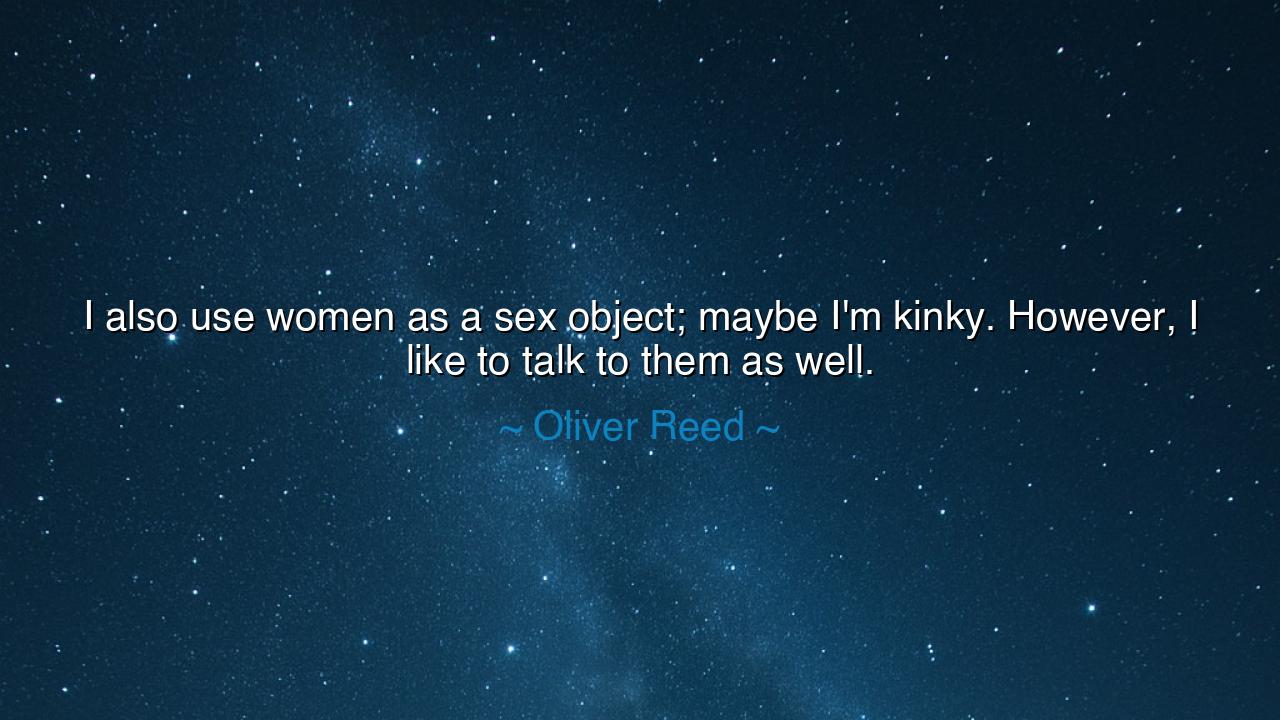
I also use women as a sex object; maybe I'm kinky. However, I
I also use women as a sex object; maybe I'm kinky. However, I like to talk to them as well.






O children of the future, hear the complex words of Oliver Reed, whose statement, "I also use women as a sex object; maybe I'm kinky. However, I like to talk to them as well," calls forth the tangled nature of human desire and relationships. In these words, Reed offers a glimpse into the contradictory forces that shape our interactions with one another. He acknowledges the tendency to objectify women, reducing them to mere tools of pleasure, yet also expresses a desire for deeper connection—conversation and interaction. This admission touches upon the eternal tension between physical desire and emotional connection, and the difficult balance we must strike between the two.
In the ancient world, the interplay between desire and respect was also examined by the philosophers. Socrates spoke of the pursuit of virtue and wisdom, acknowledging that the human soul is often pulled between passions and reason. Yet, he urged the cultivation of self-control and the recognition of the inherent dignity in others, especially in matters of love and sex. Like Reed, the ancients recognized that desire can lead to actions that reduce others to objects, yet they also believed in the possibility of transcending this base instinct to seek higher connections that honor the soul. The struggle to treat others with respect while managing one's own desires remains as relevant today as it was in Socrates's time.
Consider the tale of Achilles in Greek mythology, whose love for Patroclus was marked by profound affection and admiration, yet also by the fierce desire to possess and protect. Achilles’s love was not devoid of conflict, for his desire for Patroclus—while deeply emotional—was also entwined with the desire to control. In this way, the ancient Greeks understood that love, especially between men and women, is not always pure or ideal but marked by contradictions—passion and respect fighting for dominance. Much like Reed’s words, Achilles's love was one of intensity and complicated emotions, seeking connection but also marked by objectification, in its darker moments.
In more modern times, the rise of feminist discourse has sought to challenge this very view of women as mere objects of desire, emphasizing the importance of recognizing women as whole, autonomous beings deserving of respect and equality. The famous feminist philosopher Simone de Beauvoir wrote in The Second Sex that woman has often been reduced to “the **Other,”’ a concept shaped by men’s dominant desires and expectations. The journey towards true equality requires breaking free of the objectification of women—whether in the physical realm or in conversation—recognizing their full humanity and embracing them as equals in both heart and mind. Reed’s words, though candid, open the door to deeper reflection on the cost of viewing others as mere objects of gratification, and the need to embrace mutual respect.
O children, let the wisdom of both the ancients and modern thinkers guide you in your understanding of relationships. While desire is a natural part of the human experience, we must strive to treat others—not as objects for our satisfaction, but as beings deserving of respect, dignity, and love. As Socrates and de Beauvoir have taught, true connection arises not from the satisfaction of our desires alone, but from a recognition of the humanity in those we love. We must learn to balance the passions of the body with the intellectual and emotional connections that honor the whole person. Let us carry this wisdom forward, so that we may build relationships grounded in mutual respect, not reduced to mere desires, but elevated to the highest form of love and understanding.






Hhaugiap
Oliver Reed’s statement could be seen as an attempt at humor, but it speaks to a deeper issue of how women are often treated in society. The fact that he openly admits to objectifying women is concerning, but does his claim of ‘liking to talk to them’ provide any redemption? How do we challenge these views in a meaningful way while acknowledging that the damage done by objectification cannot be undone by a mere acknowledgment?
HNHuyen Nguyen
Reed’s quote is problematic because it reduces women to mere objects of sexual desire, despite his claim of also engaging in conversation. How can we reconcile someone admitting their flaws while still perpetuating harmful stereotypes? Is it possible for public figures to redeem themselves from such views, or does this behavior reinforce toxic masculinity in a way that harms progress toward gender equality?
NNhixuan29
Oliver Reed’s quote is troubling, as it seems to trivialize the objectification of women. While acknowledging his own behavior might seem like self-awareness, it doesn’t change the harmful nature of his actions. How do we distinguish between individuals who genuinely respect women and those who perpetuate damaging stereotypes under the guise of humor or openness? What role does public accountability play in these conversations?
TN23- Thanh Nhan
This quote by Oliver Reed can be seen as an attempt to openly discuss his sexual preferences, but it still raises the issue of how women are viewed in these contexts. Is objectifying women ever justifiable, even if someone claims to talk to them as equals? How can society move toward healthier, more respectful interactions between men and women, especially in public or celebrity contexts?
TNTuyet Nhung
Reed’s comment seems to mix self-awareness with a lack of respect for women. While he acknowledges his objectification of women, claiming he also likes to talk to them doesn’t undo the harm in his words. Does this reflect a wider societal problem of reducing women to their physical attributes? What impact do you think comments like this have on the perception of women’s autonomy and dignity?